21 Pebble Shower Floor Pros & Cons to Consider
Author: Omar Alonso | Editor: Omar Alonso
Review & Research: Jen Worst & Chris Miller
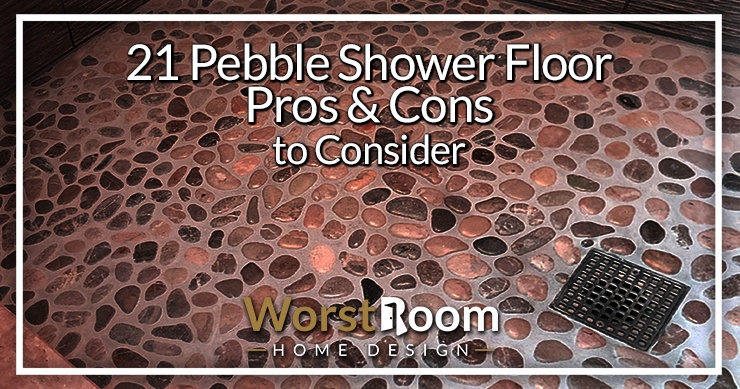
Pebble shower floors offer a natural, adventurous look and the feel of authentic stone, but what are the drawbacks? There are many pebble shower floor pros and cons to consider before you remodel.
Bathrooms and showers offer homeowners a lot of freedom when deciding what styles and textures to use. There are plenty of tiles and materials to choose from, but you must consider balancing aesthetics with comfort.
Pebble Shower Floor Pros & Cons
Ultimately, the materials affect a shower’s maintenance, safety, and cost. Pebble flooring is a great shower tile alternative, though you can find them in the tile format as well, and it's what I would recommend ultimately for most people.
The Pros of Pebble Shower Floors
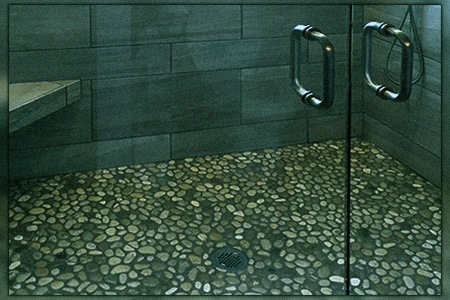
Let’s start with the main good points of pebble shower floors: the look and variety, the ease of installation, and the comfort. Then we'll list a ton of other positives in quick fashion.
Variety & Aesthetics
Not every pebble floor shower uses standard rock shapes. There are round, flat, circular, or square stones and many others. The type of pebble you pick determines the feel of the floor against your feet and how the water flows around them. In general, rounder rocks suit people who like the feel of stepping on stones, while flat ones feel like typical tile.
Pebbles also afford plenty of color choices. Some sets include a variety, but you can choose from uniform colors like slate, sea green, and brown. It is effortless to find a stone color that matches your shower walls, curtain, and other fixtures within the bathroom.
Of course, the aesthetic of a pebble shower floor is natural and appealing. It evokes rustic and beautiful images of stones drifting in clear rivers, perfect for houses with nature motifs. Even if your decor doesn’t follow a specific motif, a pebble shower floor’s exotic appeal makes an excellent accent space.
Ease of Installation
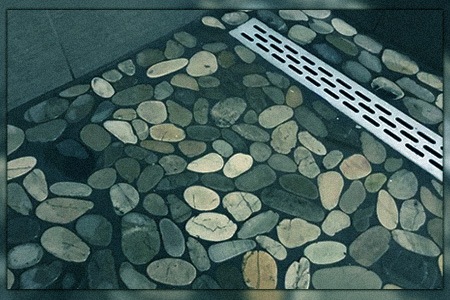
Pebble flooring in showers are an easy solution for many reasons. The first is that bags of material for these surfaces are very cheap and easy to acquire.
Almost any home goods or hardware store carries pebbles suitable for flooring, and many other types can work if you repurpose them. Keep in mind that some of the materials may be in the outdoor section of the store.
With the money you save on renovating your shower floor, you can update other fixtures in the bathroom. House remodeling can be expensive, so saving money wherever possible is rewarding.
Sometimes, pebbles for shower floor materials cost nothing at all. Yes, they can be free if you collect each of the rocks yourself. Though this significantly increases the time, labor, and cost (if paying a professional) to install the flooring over using pebble tile.
Wealthier homeowners elect to hand-pick the stones from riverbeds and significant areas or to implement meaningful ones they acquire over time. Typically this results in a more varied floor, but it does come with a higher sense of purpose.
The ease of pebble floors doesn’t stop there. Not only are the rocks cheap to acquire, but they’re also easy to set. Placing the stones down and grouting between them is something anyone can do without needing to hire someone. That means that with patience and DIY intuition, you can skip the high labor costs of professional help.
Comfort & Durability
Did you know that stepping on stones and pebbles correlates to less body tension? Many people find pebble floors not only comfortable but soothing and even pain-reducing.
Smooth stones feel great underfoot, and you can even choose slightly arching ones that suit the bottoms of your feet. There are even flat options for people who dislike that feeling.
Another factor that makes pebbles comfortable by nature is their traction. Unlike smooth tile floors, stones have an enhanced grip that helps prevent falling.
Even wet pebbles are far less likely to cause accidents than slippery tiles. Always be careful when stepping in and out of the shower, especially if your pebble floor is uneven.
Finally, pebble floors are highly durable. Unlike tiles, they won’t crack or scratch easily, no matter the pressure you exert on them. That's not to say you won't be buying these in tile form, just that they distribute weight better.
However, even if you do manage to crack your pebble shower floor, it is easy to disguise when they are damaged. Unlike uniform tiles which highlight cracks, the jagged and varied stone will hide imperfections easily. If a part chips or cracks, it’s less likely to stand out.
More Positives of Pebble Shower Flooring
Here's what's great about this flooring option, in rapid succession:
- Unique and stylish
- Slip-resistant
- Budget-friendly tiling available
- Hides an un-level floor
- Scratch-resistant
- Non-porous
- Can add value to home
This all sounds good, but make sure to continue on and learn about the negatives as well.
The Cons of Pebble Shower Floors
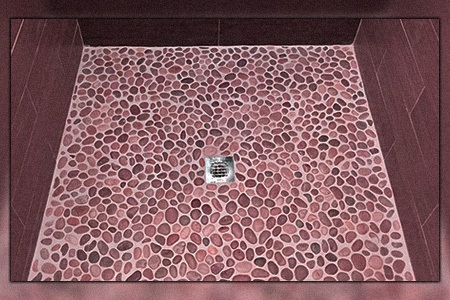
Now you’re acquainted with the positive points of pebble shower floors: variety, usefulness, ease, and price. But what about the downsides? Before you consider buying and installing rock tile shower flooring, be sure to note the cons. Stone floors require lots of upkeep, don’t work well with all water types, and break down faster than other materials.
High Maintenance
While pebble shower floors don’t scratch or break easily, they still have a handful of maintenance issues that homeowners must accommodate.
When you first install a stone surface in the bathroom, you’ll notice that due to the varied sizes and shapes, they are difficult to grout. You also have to use far more grouting material to do an adequate job, and every time you re-grout, you must repeat the entire process.
Pebble floors are highly susceptible to gaps in the sealant, so owners typically reseal every six months. That means you have to undertake the tedious grouting process twice yearly. Add on inspecting the floor, waterproofing, and retouching, and the maintenance process grows even longer and more expensive.
Furthermore, if you aren’t vigilant about maintaining the grout, mold can easily grow on or between the pebbles, which is difficult to clean.
If you’re looking for a low-maintenance shower floor, try acrylic or properly sealed marble. Both materials are highly mold resistant and easy to clean. They’re also resistant to chipping and scratching.
Susceptible to Hard Water & Mold
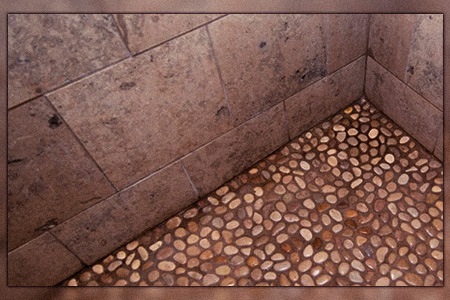
Pebble flooring is picky about the type of water your shower uses, so they aren’t suitable for every area. This is chief among the pebble tile shower floor problems, though it's really more of an annoyance that can be alleviated with regular cleaning.
While soft water doesn’t cause much of an issue, hard water leaves a chalky residue on the stones. Cleaning it off is a tedious process that you can only accomplish by hand, so the best way to deal with it is to prevent it by wiping down the shower after each use. However, doing that takes a lot of time, especially since other materials don’t encounter the same issue.
In addition, mold is an issue for pebble shower floors. Mold resistance varies by type, but rocks from river areas attract it easily. This may limit your stone choices. Even with careful and repeated grouting, washing, and drying, mold will inevitably begin to grow on the stones over time. This makes you more susceptible to those little black worms in the shower (drain fly larvae), too, which will be harder to notice between the pebbles.
Ultimately, the mold mitigation process costs extra sealant, grout, labor, and time. It is the biggest drawback to pebble shower floors, racking up plenty of unforeseen maintenance costs.
Ceramic and porcelain tiles are excellent alternatives to pebble floors. They resist hard water and molding and will not gather a chalky residue.
Wearing Out Quickly
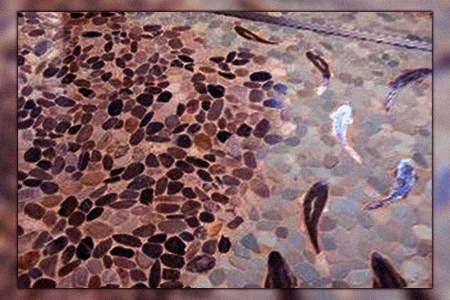
Another thing to consider when weighing pebble shower floor pros and cons is longevity. In showers, they wear out quickly. Usually, stone surfaces last a very long time, but when they encounter erosion from running water, they become more and more susceptible to many problems.
Due to the water grinding down on them, stone floors may change shape slightly over time. Especially if your pebble floor is uneven, the rocks also hold water in crevices easily, wearing out the grout and eroding the edges.
Pebbles require low effort in the beginning but more effort as they reach the end of their lifetime. That means that, at first, regular maintenance won’t be too taxing.
However, as you continually regrout and seal the damaged stones, they will require maintenance more often. Eventually, the cost of getting a new floor will eclipse the cost of repairing your old one.
Thus, while pebble floors are resilient initially, they are not sustainable for long periods. Other materials will easily last ten or fifteen years without needing to be entirely replaced, but pebbles may require changing out in under half that time, requiring access to time, money, and tile removal tools to get the job done.
More Negatives of Pebble Shower Flooring
It's not all just endless happiness once you install this type of shower flooring. Here's all the negatives to consider before embarking on this journey:
- Difficult to clean
- Tough on some people's feet
- Unsealed rocks can retain water
- May need more maintenance
- Design choices are limited
- Non-tile options are complex to install
- Disaster extends to the floor beneath
- Hard water leaves mineral deposits
The Pros & Cons of Pebble Shower Floors Demystified
With each of these pebble shower floor pros and cons in mind, you can make a better decision about what remodeling materials to use. There is no more rustic, natural, and appealing look and feel than a stone floor, but it shows more and more drawbacks over time. However, if you’ve got the time to maintain the surface and reseal it, it can fully transform your shower space.



